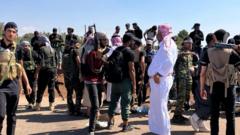The Bedouin fighters who have taken positions surrounding the southern Syrian city of Suweida expressed to BBC reporters their intention to comply with a ceasefire with the local Druze populace but do not dismiss the possibility of renewed hostilities. After days of violent sectarian confrontations involving bedouins, Druze fighters, and government soldiers, which reportedly drew airstrikes from Israel supporting the Druze, the Bedouin forces retreated to nearby villages.
On Sunday, a UK monitoring group indicated a state of "cautious calm" in the region. However, reports emerged of tribal attacks on local villages. From a Druze town now under government control, smoke could be seen billowing from Suweida. Armed government personnel blocked access to the city from a checkpoint, significantly restricting the Bedouin fighters—a situation made tense by their desire to secure the release of injured Bedouin individuals trapped in Suweida, whom they label as hostages.
The Bedouin leaders articulated their frustrations, declaring their commitment to the government-sanctioned ceasefire. Yet, they warned that if their wounded are not released, they may breach the checkpoint regardless, even if it results in further bloodshed. The sectarian strife reportedly stemmed from the recent kidnapping of a Druze merchant near Damascus, resulting in a heavy police response and exacerbating long-standing tensions between the Druze and Bedouin tribes.
In the volatile aftermath, numerous ceasefire violations and accusations of brutality have cropped up against both Druze and Bedouin factions, as well as security forces linked to the interim government. While local Druze forces have regained control of Suweida following a governmental deployment of security troops, the violent events have claimed over 1,120 lives, including significant losses both among Druze and government security personnel.
With the UN migration agency reporting displacement of approximately 128,000 individuals due to the conflict, the medical supply situation in Suweida has become dire. A humanitarian aid convoy reached the city, reportedly supplemented by emergency medical supplies from Israel.
In displacement zones like Mia'rbah, Bedouin refugees gathered amid the devastation of their former homes and awaited aid. Many residents expressed skepticism about the future coexistence of Bedouin and Druze communities, suggesting the necessity of a stable government presence to foster trust and security. Without such stability, sentiments leaned towards viewing the Druze with distrust and hostility, complicating any hopes for a peaceful resolution.
On Sunday, a UK monitoring group indicated a state of "cautious calm" in the region. However, reports emerged of tribal attacks on local villages. From a Druze town now under government control, smoke could be seen billowing from Suweida. Armed government personnel blocked access to the city from a checkpoint, significantly restricting the Bedouin fighters—a situation made tense by their desire to secure the release of injured Bedouin individuals trapped in Suweida, whom they label as hostages.
The Bedouin leaders articulated their frustrations, declaring their commitment to the government-sanctioned ceasefire. Yet, they warned that if their wounded are not released, they may breach the checkpoint regardless, even if it results in further bloodshed. The sectarian strife reportedly stemmed from the recent kidnapping of a Druze merchant near Damascus, resulting in a heavy police response and exacerbating long-standing tensions between the Druze and Bedouin tribes.
In the volatile aftermath, numerous ceasefire violations and accusations of brutality have cropped up against both Druze and Bedouin factions, as well as security forces linked to the interim government. While local Druze forces have regained control of Suweida following a governmental deployment of security troops, the violent events have claimed over 1,120 lives, including significant losses both among Druze and government security personnel.
With the UN migration agency reporting displacement of approximately 128,000 individuals due to the conflict, the medical supply situation in Suweida has become dire. A humanitarian aid convoy reached the city, reportedly supplemented by emergency medical supplies from Israel.
In displacement zones like Mia'rbah, Bedouin refugees gathered amid the devastation of their former homes and awaited aid. Many residents expressed skepticism about the future coexistence of Bedouin and Druze communities, suggesting the necessity of a stable government presence to foster trust and security. Without such stability, sentiments leaned towards viewing the Druze with distrust and hostility, complicating any hopes for a peaceful resolution.


















